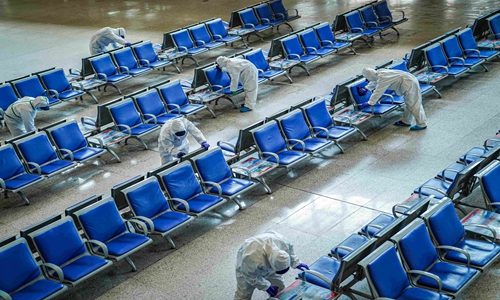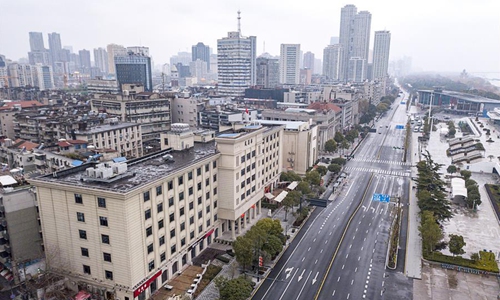

Despite easing restrictions, Hubei locals struggle to return to workplaces

Government health employees and firefighters disinfect the Wuhan Railway Station with power sprayers on Tuesday. Photo: cnsphoto.com
After two months of complete isolation of Central China's Hubei Province, especially its capital Wuhan, authorities announced on Tuesday to lift outbound travel restrictions on cities excluding Wuhan beginning Wednesday and to end the lockdown of one of the most virus-stricken cities on April 8, signaling that the domestic battle against the deadly coronavirus will score victory.
However, this battle has not come to an end, as more people from Hubei will return to megacities like Beijing and Shanghai, bringing mounting pressure on cities that have been already facing growing imported cases of infections. It's time for shifting the focus of the prevention and control work toward relapses of domestic cases and increases of imported ones, officials and analysts warned.
It has been over two months since Wuhan, a city with about 11 million people, hit hardest by the virus, was completely locked down as part of China's decisive and aggressive measures that gained a window of opportunity not only for the country but also for the entire world.
The outbreak has changed everyone's life, as people in Hubei have been following strict quarantine measures while hundreds of thousands of restaurants, shops and public venues have been shut down, such stringent measures are also believed to be the only effective way of cutting transmission routes of this highly contagious disease, about which the public has very limited knowledge.
Lifting lockdowns and easing travel restrictions appeared to be an exciting and inspiring gesture for millions of locally born residents who sacrificed their freedom of movement for important public interests, especially those who work in cities like Beijing, Shanghai, Hangzhou in Zhejiang Province and Guangzhou in Guangdong Province.
Hubei railway authorities announced on Tuesday night to resume services inside railway stations within Hubei Province from Wednesday, except for Wuhan. Rail services in Wuhan will resume on April 8.
As one of the major labor exporting regions in the country, about 6 million Hubei residents now work outside their home province and 70 percent of them had returned to their hometowns for the Spring Festival holidays in January and have been stranded ever since.
For some of those trapped at home, the prolonged holidays have become much more stressful rather than relaxing as they might have faced losing their jobs due to a delayed return, or being kicked out by landlords following discrimination against people from the region where the earliest infection cases were reported in the country.
But now, some of them are struggling in new dilemma: Does lifting travel restrictions mean everyone stranded in the province can go back immediately? Who goes first and who has to wait for further instructions? Does it mean the COVID-19 battle comes to an end and Hubei is a safe place now?
Given growing concerns over increasing numbers of imported cases of COVID-19 from abroad, a high proportion of covert coronavirus cases, in addition to loopholes in screening processes at custom and inadequate quarantine measures, the risks of a second wave of outbreaks in China looms, raising concerns among medical experts and observers over whether other cities outside Hubei are well prepared to receive the influx of new arrivals from the province.
Steps to follow
The National Health Commission said no new confirmed cases have been reported in Hubei from Wednesday to Sunday, and the World Health Organization said Wuhan's recovery from the COVID-19 outbreak gives the rest of the world hope as the highly contagious disease has spread to 169 countries and regions as of Tuesday, data from Johns Hopkins University of Medicine shows.
Ying Yong, Hubei provincial Party chief, said on Tuesday that the spread of COVID-19 in Wuhan's main battlefield has been contained, and the province has made significant progress in preventing the spread in the province and exporting infection cases to other parts of the country. Gradually lifting restrictions marked restoration of the economic and social order, he said.
Keeping track of recovered patients is paramount after lifting the lockdown, said Zheng Shuqian, a Wuhan doctor, explaining that uncertainties still remain as we don't know if the virus is completely out of recovered patients' systems. Is it possible for those patients to re-transmit the virus, Zheng asked.
Sporadic infections can be brought under control, but possible "invisible transmission" from asymptomatic patients or those recovered patients are the focus of future viral prevention work, said Zheng. "We still face an arduous long journey of pursuing follow-up viral prevention work," he remarked.
A local resident with online name Silvia who has been staying in her hometown Yichang, a city about 400 kilometers away from Wuhan, said she has been working from home since the lockdown. She told the Global Times on Tuesday that she has registered on an app called Jingxin Xiangzhu to provide her personal information, a must-do step before getting further notification about whether she is qualified to leave Hubei and return to Beijing, where her employer is..
"Until now, I haven't received any further instructions, and some circulating information said we could not go back even if local governments ease the travel ban," she said, noting that instead some should follow the instructions issued by the Beijing authorities on February 27 by not returning to Beijing for the moment.
Chen Bei, Beijing municipal government's deputy secretary general, told a press conference on February 27 that residents in Hubei can't return to Beijing and people from other regions coming to Beijing should undergo a 14-day mandatory quarantine.
Still, some local residents in Shiyan and Xiangyang - two Hubei cities - are prepared to leave by train on Wednesday, heading to Beijing, with the first group of returnees potentially surpassing 1,000 people, as several WeChat group chats showed.
An official surnamed Zhou in a Beijing community confirmed to the Global Times that they had received a notice from superiors one day before to begin accepting people stranded in Hubei to return to Beijing.
The returning workers are expected to arrive in the nation's capital city at the Beijing West Railway Station starting Wednesday, Zhou said, noting that they are required to undertake 14-day quarantine at home after their arrival.
Another worker in a community in the Chaoyang district told the Global Times on Tuesday under the condition of anonymity that they had not received any notices about such arrangements of receiving people from Hubei. In response to safety concerns, he said that there is no need to worry as those people have been quarantined in Hubei for two months but showed no symptoms so they should be healthy.
Remaining on high alert

Aerial photo taken on Jan. 26, 2020 shows a riverside boulevard in Wuhan, central China's Hubei Province. Many residents here have reduced or avoided outdoor activities during the Spring Festival holiday in Wuhan, the hardest-hit city of the novel coronavirus outbreak in central China. (Xinhua/Xiong Qi)
Though lifting the lockdown is also seen as a major sign that the country has scored a victory in the COVID-19 battle, China still faces growing uncertainties in the next phase of prevention and control work, given growing numbers of imported infections from overseas as well as accelerating resumption of work.
Yang Zhanqiu, a virologist at Wuhan University, said that lifting the travel ban in Wuhan also signals China's viral prevention battlefield is shifting to metropolises such as Beijing, Shanghai and Guangzhou, where imported infection cases have been surging in recent days.
The Chinese central government's leading group for steering COVID-19 prevention warned on Tuesday that domestic COVID-19 transmission has been stopped in China, but risks of sporadic and regional clusters of infection still exist.
Zeng Guang, chief epidemiologist with the Chinese Center for Disease Control and Prevention, said in an online broadcasting interview on Tuesday that it's not the time to discuss whether COVID-19 comes to an end but to share prevention experiences and enhance control work. "If the coronavirus still exists in one country, then the virus still exists, we can't declare an end [to this war]," Zeng said.

 Award-winning photos show poverty reduction achievements in NE China's Jilin province
Award-winning photos show poverty reduction achievements in NE China's Jilin province People dance to greet advent of New Year in Ameiqituo Town, Guizhou
People dance to greet advent of New Year in Ameiqituo Town, Guizhou Fire brigade in Shanghai holds group wedding
Fire brigade in Shanghai holds group wedding Tourists enjoy ice sculptures in Datan Town, north China
Tourists enjoy ice sculptures in Datan Town, north China Sunset scenery of Dayan Pagoda in Xi'an
Sunset scenery of Dayan Pagoda in Xi'an Tourists have fun at scenic spot in Nanlong Town, NW China
Tourists have fun at scenic spot in Nanlong Town, NW China Harbin attracts tourists by making best use of ice in winter
Harbin attracts tourists by making best use of ice in winter In pics: FIS Alpine Ski Women's World Cup Slalom
In pics: FIS Alpine Ski Women's World Cup Slalom Black-necked cranes rest at reservoir in Lhunzhub County, Lhasa
Black-necked cranes rest at reservoir in Lhunzhub County, Lhasa China's FAST telescope will be available to foreign scientists in April
China's FAST telescope will be available to foreign scientists in April